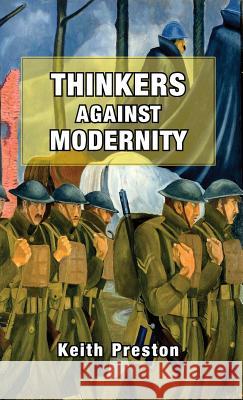Thinkers Against Modernity » książka
Thinkers Against Modernity
ISBN-13: 9781910881354 / Angielski / Twarda / 2016 / 130 str.
Thinkers Against Modernity
ISBN-13: 9781910881354 / Angielski / Twarda / 2016 / 130 str.
(netto: 127,95 VAT: 5%)
Najniższa cena z 30 dni: 134,35
ok. 16-18 dni roboczych.
Darmowa dostawa!
The prevailing sentiment of contemporary intellectuals is that the human condition has never been better. History is regarded as lengthy episode of oppression that human beings have gradually but steadily fought to overcome with considerable success. Evidence of these successes that are commonly offered include increased material consumption, better health and longer life expectancy, technological development and, above all, the ongoing triumph of "democracy" and "human rights." However, the nineteenth and twentieth century produced an array of dissident thinkers that expressed a great skepticism of modern civilization. Their individual critiques were often vastly different from one another. Yet the common idea that emerges from work of these genuine intellectual mavericks is one that laments the loss of traditional societies, and pessimism about the new world that modernity has brought. Instead, the modern project has been regarded by thinkers as different as Nietzsche, G.K. Chesterton and Alain De Benoist to have been a cultural and spiritual degeneration that diminished rather than elevated the nobility of man. This work by Keith Preston examines the ideas of these thinkers, and considers the potential relevance of their insights in the postmodern age.
The prevailing sentiment of contemporary intellectuals is that the human condition has never been better. History is regarded as lengthy episode of oppression that human beings have gradually but steadily fought to overcome with considerable success. Evidence of these successes that are commonly offered include increased material consumption, better health and longer life expectancy, technological development and, above all, the ongoing triumph of “democracy” and “human rights.”However, the nineteenth and twentieth century produced an array of dissident thinkers that expressed a great skepticism of modern civilization. Their individual critiques were often vastly different from one another. Yet the common idea that emerges from work of these genuine intellectual mavericks is one that laments the loss of traditional societies, and pessimism about the new world that modernity has brought. Instead, the modern project has been regarded by thinkers as different as Nietzsche, G.K. Chesterton and Alain De Benoist to have been a cultural and spiritual degeneration that diminished rather than elevated the nobility of man.This work by Keith Preston examines the ideas of these thinkers, and considers the potential relevance of their insights in the postmodern age.











